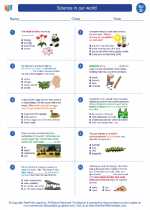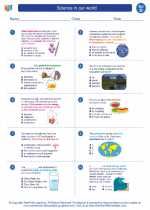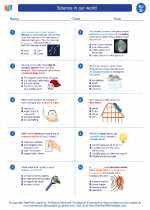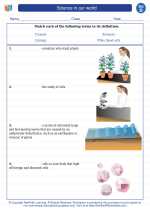Effect
An effect is a change that is a result or consequence of an action or other cause. It is what happens as a result of some event or action.
Types of Effects
There are different types of effects:
- Cause and Effect: This is when one event causes another event to happen. For example, if it rains, the ground gets wet.
- Physical Effects: These are effects that result from physical actions or forces, such as pushing a ball and making it move.
- Chemical Effects: These are effects that occur as a result of chemical reactions, such as mixing two chemicals and seeing them react.
- Biological Effects: These are effects that occur in living organisms, such as the effect of sunlight on plant growth.
Examples of Effects
Here are some examples of effects:
- Effect of heat on ice: When ice is heated, it melts and turns into water.
- Effect of exercise on the body: Regular exercise can improve physical fitness and overall health.
- Effect of light on plants: Plants need light for photosynthesis, which is crucial for their growth and survival.
Study Tips
When studying the concept of effect, it's important to:
- Understand the cause and effect relationship in different scenarios.
- Observe and analyze various effects in the natural world and in everyday life.
- Practice identifying and explaining different types of effects, such as physical, chemical, and biological effects.
- Use diagrams and visual aids to illustrate cause and effect relationships.
- Discuss and debate the potential effects of specific actions or events.
Summary
In summary, an effect is the result or consequence of an action or other cause. It can be observed in various forms, including cause and effect relationships, physical effects, chemical effects, and biological effects. Understanding the concept of effect is important for analyzing and predicting outcomes in science and everyday life.
[Effect] Related Worksheets and Study Guides:
.◂Science Worksheets and Study Guides Fourth Grade. Science in our world
Study Guide Science in our world - 4th gr.
Science in our world - 4th gr.  Worksheet/Answer key
Worksheet/Answer key Science in our world - 4th gr.
Science in our world - 4th gr.  Worksheet/Answer key
Worksheet/Answer key Science in our world - 4th gr.
Science in our world - 4th gr.  Worksheet/Answer key
Worksheet/Answer key Science in our world - 4th gr.
Science in our world - 4th gr.  Vocabulary/Answer key
Vocabulary/Answer key Science in our world - 4th gr.
Science in our world - 4th gr. 

 Worksheet/Answer key
Worksheet/Answer key
 Worksheet/Answer key
Worksheet/Answer key
 Worksheet/Answer key
Worksheet/Answer key
 Vocabulary/Answer key
Vocabulary/Answer key

The resources above cover the following skills:
History and Nature of Science: A student should understand the history and nature of science. A student who meets the content standard should:
Develop an understanding that historical perspectives of scientific explanations demonstrate that scientific knowledge changes over time, building on prior knowledge.
Develop an understanding that scientific knowledge is ongoing and subject to change as new evidence becomes available through experimental and/or observational confirmation(s).